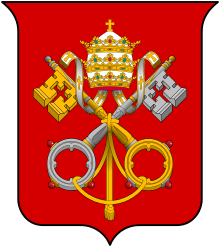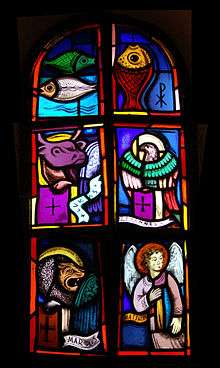Pope Linus
| Pope Saint Linus | |
|---|---|
 | |
| Papacy began | c. AD 67 |
| Papacy ended | c. AD 76 |
| Predecessor | Peter |
| Successor | Anacletus |
| Orders | |
| Ordination | by Saint Paul |
| Personal details | |
| Born |
Unknown Volterra, Tuscany, Italy, Roman Empire |
| Died |
c. AD 76 Rome, Italy, Roman Empire |
| Sainthood | |
| Feast day | 23 September |
| Venerated in |
Anglicanism Lutheranism Roman Catholicism |
Linus (died c. AD 76) was, according to several early sources, the second Bishop of Rome, and is listed by the Catholic Church as the second pope.
His papacy lasted from c. AD 67 to his death. According to other early sources, Pope Clement I was the second pope; according to the Catholic Church's Annuario Pontificio, however, Clement I was the fourth pope. Among those believed by the Catholic Church to have held the position of pope, only Peter, Linus and Clement are specifically mentioned in the New Testament.[1]
Early Bishops of Rome
The earliest witness to Linus's status as bishop was Irenaeus, who in about the year 180 wrote, "The blessed apostles, then, having founded and built up the Church, committed into the hands of Linus the office of the episcopate."[2] The Oxford Dictionary of Popes interprets Irenaeus as classifying Linus as the first bishop of Rome.[3] Linus is presented by Jerome as "the first after Peter to be in charge of the Roman Church"[4] and by Eusebius as "the first to receive the episcopate of the church at Rome, after the martyrdom of Paul and Peter".[5] John Chrysostom wrote, "This Linus, some say, was second Bishop of the Church of Rome after Peter",[6] while the Liberian Catalogue[7] presents Peter as the first Bishop of Rome and Linus as his successor in the same office.
The Liber Pontificalis[8] also presents a list that makes Linus the second in the line of bishops of Rome, after Peter, while also stating that Peter consecrated two bishops, Linus and Anacletus, for the priestly service of the community, devoting himself instead to prayer and preaching, and that it was to Clement that he entrusted the Church as a whole, appointing him as his successor. Tertullian too wrote of Clement as the successor of Peter.[9] Jerome classified Clement as "the fourth bishop of Rome after Peter" (i.e., fourth in a series that included Peter), adding that, "most of the Latins think that Clement was second after the apostle."[10]
The Apostolic Constitutions[11] denote that Linus, who was consecrated by Paul, was the first bishop of Rome and was succeeded by Clement, who was ordained and consecrated by Peter. Cletus is considered Linus's successor by Irenaeus, and the others cited above, who present Linus either as the first bishop of Rome or, if they give Peter as the first, as the second.
Life
The Liberian Catalogue and the Liber Pontificalis date Linus's episcopate to 56–67, during the reign of Nero, but Jerome dates it to 67–78, and Eusebius puts the end of his episcopate at the second year of the reign of Titus (80).
A man named Linus is mentioned in the closing greeting of the Second Epistle to Timothy.[12] In that epistle, Linus is noted as being with Paul in Rome near the end of Paul's life. Irenæus stated that this is the same Linus who became Bishop of Rome, a view that is generally still accepted.
According to the Liber Pontificalis, Linus was an Italian born in Volterra in the Tuscany region. His father's name was recorded as Herculanus. The Apostolic Constitutions name his mother as Claudia (immediately after the name "Linus" in 2 Timothy 4:21 a Claudia is mentioned, but the Apostolic Constitutions does not explicitly identify that Claudia was Linus's mother). According to Liber Pontificalis, Linus issued a decree that women should cover their heads in church, created the first fifteen bishops, and that he died a martyr and was buried on the Vatican Hill next to Peter. It gives the date of his death as 23 September, the date on which his feast is still celebrated.[13] His name is included in the Roman Canon of the Mass.
.jpg)
With respect to Linus's supposed decree requiring women to cover their heads, J.P. Kirsch commented in the Catholic Encyclopedia: "Without doubt this decree is apocryphal, and copied by the author of the Liber Pontificalis from the first Epistle of St. Paul to the Corinthians (11:5) and arbitrarily attributed to the first successor of the Apostle in Rome. The statement made in the same source, that Linus suffered martyrdom, cannot be proved and is improbable. For between Nero and Domitian there is no mention of any persecution of the Roman Church; and Irenaeus (1. c., III, iv, 3) from among the early Roman bishops designates only Telesphorus as a glorious martyr."[1]
The Roman Martyrology does not list Linus as a martyr. The entry about him is as follows: "At Rome, commemoration of Saint Linus, Pope, who, according to Irenaeus, was the person to whom the blessed Apostles entrusted the episcopal care of the Church founded in the City, and whom blessed Paul the Apostle mentions as associated with him."[13]
A tomb found in St. Peter's Basilica in 1615 by Torrigio was inscribed with the letters LINVS, and was once taken to be Linus's tomb. However a note by Torrigio shows that these were merely the last five letters of a longer name (e.g. Aquilinus or Anullinus). A letter on the martyrdom of Peter and Paul was once attributed to him, but in fact dates to the 6th century.[1]
See also
References
- 1 2 3 Kirsch, Johann Peter (1910). "Pope St. Linus" in The Catholic Encyclopedia. Vol. 9. New York: Robert Appleton Company.
- ↑ Against Heresies 3:3.3
- ↑ J. N. D. Kelly, Oxford Dictionary of Popes, 2005
- ↑ "Post Petrum primus Ecclesiam Romanam tenuit Linus" -Chronicon; 14g (p. 267)
- ↑ Church History 3.2
- ↑ "CHURCH FATHERS: Homily 10 on Second Timothy (Chrysostom)".
- ↑ The Chronography of 354 AD Part 13: Bishops of Rome
- ↑ Liber Pontificalis 2
- ↑ "CHURCH FATHERS: The Prescription Against Heretics (Tertullian)".
- ↑ "CHURCH FATHERS: De Viris Illustribus (Jerome)".
- ↑ Apostolic Constitutions 7.4
- ↑ 2 Timothy 4:21
- 1 2 Martyrologium Romanum (Libreria Editrice Vaticana, 2001 ISBN 88-209-7210-7)
Further reading
- Louise Ropes Loomis, The Book of Popes (Liber Pontificalis). Merchantville, NJ: Evolution Publishing. ISBN 1-889758-86-8 (Reprint of the 1916 edition. Stops with Pope Pelagius, 579–590. English translation with scholarly footnotes, and illustrations).
- I SOMMI PONTEFICI ROMANI: The Roman Pontiffs
External links
 Herbermann, Charles, ed. (1913). "Pope St. Linus". Catholic Encyclopedia. New York: Robert Appleton Company.
Herbermann, Charles, ed. (1913). "Pope St. Linus". Catholic Encyclopedia. New York: Robert Appleton Company.
| Titles of the Great Christian Church | ||
|---|---|---|
| Pope Linus Papal succession | ||
| Preceded by Peter |
Bishop of Rome 67–79 |
Succeeded by Anacletus |

